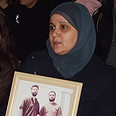
Rally in support of strikers
צילום: חסן שעלאן
Red Cross, UN appeal for Palestinian hunger strikers
Humanitarian agency says six prisoners held in Israel in 'imminent danger of dying' and must be transferred to hospital; add 'it is essential that their choice be respected and their human dignity preserved'
The International Committee of the Red Cross called on Israel on Tuesday to transfer six Palestinians who have been on hunger strike for weeks to hospital and allow visits from their families.
Related articles:
- Hamas warns Israel against hunger strike deaths
- 'Victory will be greater if hunger strikers die'
- IPS: Palestinian inmates' demands examined
All six are in prison under Israel’s long-standing policy of detaining people it suspects of security offences or plotting attacks in a closed military proceeding between security forces and military judges rather than after a formal trial. Prison terms for “administrative detainees” are renewable for six months at a time.
In a statement, the humanitarian agency said that the six are in “imminent danger of dying”, although it upheld their right to choose whether or not they wanted to receive treatment.
“We urge the detaining authorities to transfer all six detainees without delay to a suitable hospital so that their condition can be continuously monitored and so that they can receive specialized medical and nursing care,” said Juan Pedro Schaerer, head of the ICRC delegation in Israel and the Palestinian territories.
The six have refused food for between 47 and 71 days, and are among more than 1,600 detainees who have been on hunger strike for some three weeks, according to the ICRC.
“Their main demands are for a resumption of family visits from Gaza and for an end to solitary confinement in Israeli places of detention,” it said.
'International law is clear'
The fate of the hunger strikers has touched a raw nerve in the Palestinian territories with daily demonstrations in the West Bank and Gaza Strip to support the protest.
In an interview with Reuters on Tuesday Palestinian Prime Minister Salam Fayyad said there would be serious repercussions if any of the prisoners died.
“The most tragic thing is if you look at the list of demands they have presented Israel … they are generally related to the basic rights of prisoners,” he said in the West Bank city of Ramallah. “There is a clear violation of the Geneva conventions.”
The ICRC’s Shaerer stressed that the strikers’ right to fast is protected by international conventions.
“While we are in favor of any medical treatment that could benefit the detainees, we would like to point out that, under resolutions adopted by the World Medical Association, the detainees are entitled to freely choose whether to consent to be fed or to receive medical treatment,” he said.
“It is essential that their choice be respected and their human dignity preserved,” he said.
On Monday, Israel’s Supreme Court turned down an appeal by two Palestinians who have been on hunger strike for the past 70 days, to free them from detention without trial.
But in its decision the court said security authorities should consider freeing them for medical reasons.
The scope of the hunger strike has posed a new challenge to Israel, which has come under international criticism over detention without trial and could face a violent Palestinian backlash if any of the protesters die.
The office of United Nations High Commissioner for Human Rights Navi Pillay also voiced concern on the strikers’ fate.
“International law is clear: administrative detention should only be used in exceptional cases and only for imperative reasons of security. Administrative detainees have the right to challenge the lawfulness of the detention,” spokeswoman Ravina Shamdasani told a news briefing.
Independent UN investigators and UN rights bodies have raised concerns about Israel’s frequent and extensive use of administrative detention, including of children, infringing on detainees right to a fair trial, Shamdasani said.
- Follow Ynetnews on Facebook and Twitter
- Receive Ynetnews updates directly to your desktop










